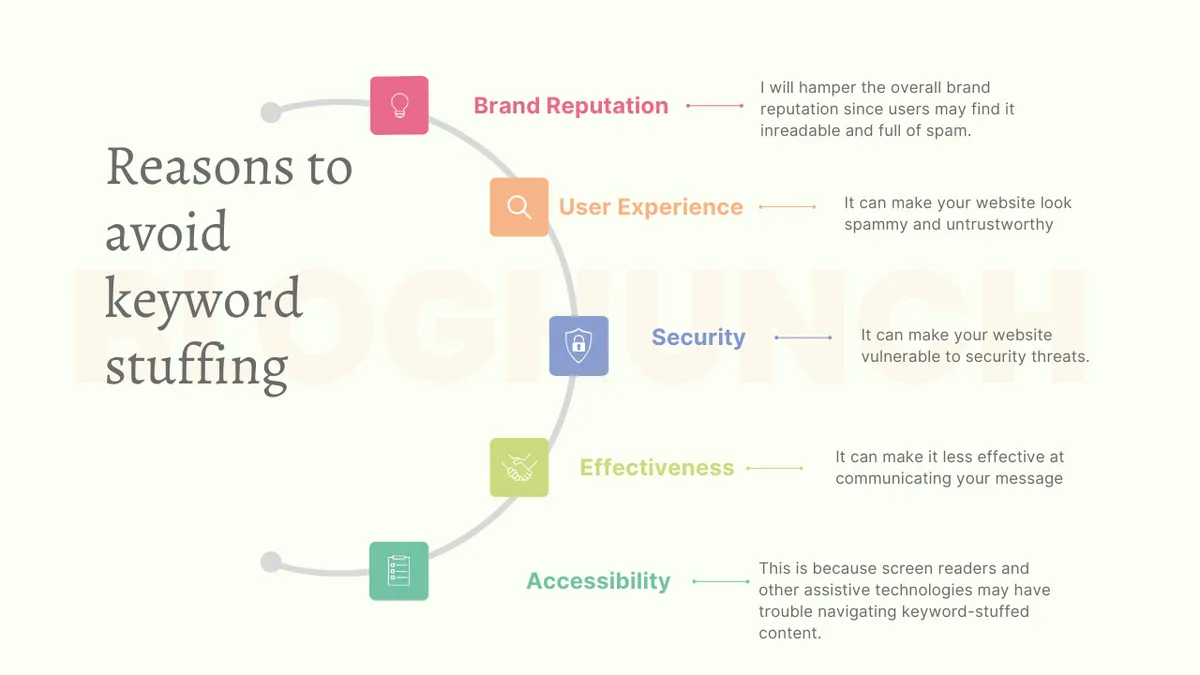Create a NuxtJS blog with a free BlogHunch account
BlogHunch is a next-generation blogging platform that lets you get started with your publication in 60 seconds. It has a full-featured API that lets you connect...

Keyword stuffing is a common practice among some webmasters and marketers, but it's a tactic that should be avoided at all costs. In this article, we'll be discussing the reasons why you should avoid keyword stuffing, and what you can do instead to improve your search engine optimization (SEO) efforts.
First and foremost, keyword stuffing is a violation of the search engine's guidelines. Google, in particular, takes a very dim view of keyword stuffing and can penalize or even ban websites that engage in this practice. In other words, if you're stuffing your content with keywords, you're putting your website at risk of being penalized by search engines.
But that's not the only reason to avoid keyword stuffing. Here are a few more:

Keyword stuffing doesn't work: Contrary to what some people believe, it doesn't actually improve your search engine rankings. In fact, it can have the opposite effect and cause your website to be ranked lower in the search results. This is because search engines are designed to identify and penalize websites that engage in such practices.
It can harm your website's user experience: Keyword stuffing can make your content difficult to read and can make it seem unnatural or spammy. This can turn off your website's visitors and can make them less likely to engage with your content or share it with others.
Keyword stuffing can harm your brand's reputation: If your website is full of keyword-stuffed content, it can make your brand appear spammy and untrustworthy. This can harm your reputation and can make it more difficult for you to build trust and credibility with your audience.
This practice can make your content less effective: If your content is stuffed with keywords, it can make it less effective at communicating your message. This can make it less likely that your content will be shared or linked to, and can make it less effective at achieving your marketing goals.
Keyword stuffing can make your website less accessible: If it is stuffed with keywords, it can make it difficult for people with disabilities to access your content. This is because screen readers and other assistive technologies may have trouble navigating keyword-stuffed content.
They can make your website less secure: If your website is stuffed with keywords, it can make it more vulnerable to security threats. This is because some forms of keyword stuffing, such as hidden text, can be used by hackers to insert malicious code into your website.
It can make your website less valuable: If your website is stuffed with keywords, it can make it less valuable to both users and search engines. This is because keyword-stuffed content provides little value to users, and is not considered relevant by search engines. This can make your website less likely to rank well in the search results and can make it less valuable to advertisers and other stakeholders.
So, what should you do instead? Here are a few tips for improving your SEO without resorting to keyword stuffing:
Focus on creating high-quality content: Instead of stuffing your content with keywords, focus on creating content that is useful, informative, and engaging. This will make it more likely that your content will be shared, and will help you to build a loyal and engaged audience.
Use keywords naturally: Instead of cramming your content with keywords, use them naturally and sparingly. This will make your content more readable and will help you to avoid being penalized by search engines.
Use other SEO tactics: In addition to avoiding keyword stuffing, there are many different tactics that you can use to improve your search engine rankings. This can include building high-quality backlinks, optimizing your website's title and meta tags, and using social media to promote your content.
In conclusion, keyword stuffing is a tactic that should be avoided at all costs. It's a violation of the search engine's guidelines, and it can harm your website's user experience and reputation. Instead, focus on creating high-quality content and using other SEO tactics to improve your search engine rankings.
Partager cet article